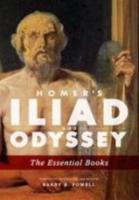
HOMER: THE ODYSSEY – OUP (2014) p/b 488pp £10.99 (ISBN 9780199925889)
HOMER’S ILIAD AND ODYSSEY: The Essential Books – OUP (2015) p/b 536pp £12.99 (ISBN 9780199394074)
When Dr. Powell told his friends about this project (p. xi), they said ‘But hasn’t Homer already been translated many times?’ It was a good question. If one enters ‘The Odyssey by Homer’ in Amazon, 75 relevant pages come up with many translations (Powell says there are over 130). And I see yet another version of The Iliad by Peter Green (California) out this month and a new version of the Odyssey by Anthony Verity forthcoming from OUP, none other. It leaves one suspecting that this is a publisher’s meal-ticket.
I came across Powell first in Homer and the Origin of the Greek Alphabet (1991) where he argues that the Greek alphabet was invented in Euboea to write down Homer’s epics. He believes that one oral poet was responsible for both epics, and that there was a real war between Mycenaean Greeks on the plain in front of Hissarlik. He has written extensively on mythology, co-edited with I. Morris A New Companion to Homer (1997), and wrote an excellent Homer in the Blackwell introductory series (2007). Clearly we are in good hands.
To start at the end with P.’s bibliography, he cites an eclectic list of about 50 volumes. In recent translations, the transatlantic divide is only too obvious. Lattimore and Fagles, roughly versified, we do not read, preferring the honest prose of Rieu, Rieu/Jones, Shewring and Hammond, for example, not of course suggested here. Of the rest of the 50, most are on my shelves, so far from exotic. I find it odd that, with only one commentary listed, it should be the OUP three-volume edition by Heubeck et al., with no mention of Stanford. To recommend to beginners Janko’s controversial, difficult and brilliant book Homer, Hesiod and the Hymns is unkind.
Next to the beginning—the Introduction (36 pp)—and it is splendid. When I began reading Homer, it was R. C. Jebb’s Introduction to Homer which got me properly started. Powell’s introduction does the same job. He takes the history of the text through the Peisistratid recension and the Alexandrian vulgate to the analysts and the unitarians and Parry’s oral-formulaic theory. He is best, not surprisingly, on the nature of early texts, and the graphic representation of song, for the human voice puts out a continuous sound, and as he splendidly says ‘The song is like a stream, but the alphabetic signs are like a row of buckets’(p. 20). He deals, among other things, with Homer and history, Schliemann’s Troy, nostos, and mythic patterns in the Odyssey.
So what about the translation? Of course, it is fine in terms of both meaning and register, nor would one expect less. He chooses a ‘loose five-beat line’ as a middle course between verse and prose ‘which seems wrong for Homer’. Well, it’s prose to me, nor do I mind the regular separation of lines, since I tend to read prose like that anyway. If prose really is wrong for Homer, then we should look at Rodney Merrill’s Iliad (2007), definitely verse, and desperately hard to do.
OUP has produced a big heavy handsome paperback. It is well set out, has few typos, and—miraculous—has footnotes not endnotes, (brief and helpful). At the price of £10.99, it is worth it for the introduction alone, and presents a translation worthy to be added to the multitude, where, I suspect, it may float toward the top.
As for Homer’s Iliad And Odyssey: The Essential Books, this, I fear, need not take long. We have here The Iliad omitting books 7, 10 and 17: and the Odyssey omitting books 2, 3, 7, 14, 15, 18 and 20. This is done so that ‘the modern reader can grasp the meaning of the poems and not be distracted by their length and sometimes exasperating complexity’. But that, Dr. Powell and OUP, is half the fun. The translations in themselves have been well received, and need no further praise here.
K. B. Saunders—Blackheath
